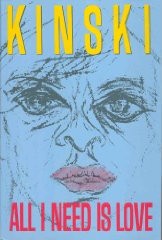All I Need Is Love: Difference between revisions
HairyWombat (talk | contribs) m →Reception: Improved <ref> |
HairyWombat (talk | contribs) m →Reception: Typo |
||
| Line 35: | Line 35: | ||
| first1 = James E. |
| first1 = James E. |
||
| last1 = Wise |
| last1 = Wise |
||
| |
| author1-link = James E. Wise, Jr. |
||
| first2 = Scott |
| first2 = Scott |
||
| last2 = Baron |
| last2 = Baron |
||
Revision as of 16:02, 6 August 2011
 --> -->First edition cover artwork by Klaus Kinski | |
| Author | Klaus Kinski |
|---|---|
| Translator | Klaus Kinski[1] |
| Cover artist | Klaus Kinski |
| Subject | Autobiography |
| Publisher | Random House |
Publication date | November 28, 1988 |
| Media type | Print (hardback) |
| Pages | 265 pp (first edition) |
| ISBN | ISBN 0-394-54916-3 Parameter error in {{ISBNT}}: invalid character |
| OCLC | 18379547 |
All I Need Is Love: A Memoir is the autobiography of the German actor Klaus Kinski first published in 1988. It was withdrawn from publication then, after the author's death, retranslated, retitled, and republished in 1996 as Kinski Uncut: The Autobiography of Klaus Kinski.
Reception
When the 1988 edition was published, Klaus Kinski's daughter, Nastassja Kinski, sued her father for libel but the lawsuit was quickly withdrawn.[2] The 1988 edition was withdrawn from publication because of a copyright dispute between Random House and a West German publisher,[1] and because Marlene Dietrich threatened to sue for libel.[3][4] The book was republished in 1996 after Dietrich had died.
In the book Herzog on Herzog, Werner Herzog describes the book as highly fictitious, and that Kinski did not grow up in abject poverty.[5] Herzog also relates how he and Kinski together sought new insults to describe Herzog for the book.[6]
Chapters
The book is written entirely in the present tense, and rarely gives temporal references. It is divided into five chapters:
Chapter One describes his early life up to his discovery of sex and his outrageous desire for it. Chapter Two deals with his short career in the military, his first theatre experiences and successes, his entrance into an insane asylum. The third chapter deals with his comeback. Chapter Five deals with his marriage.
Editions
The manuscript was written in German. It was translated by the author and was published as a book in English in 1988. It was retranslated by Joachim Neugröschel and reissued in 1996 with the title Kinski Uncut: The Autobiography of Klaus Kinski. Each edition has material omitted from the other, and the second edition is more cautious naming names.[1]
- Kinski, Klaus (November 28, 1988). All I Need Is Love: A Memoir. translated by Klaus Kinski, cover artwork by Klaus Kinski (1st ed.). New York: Random House. p. 265. ISBN 0-394-54916-3. OCLC 18379547.
- Kinski, Klaus (August 1, 1996) [First published 1988]. Kinski Uncut: The Autobiography of Klaus Kinski. translated by Joachim Neugröschel (2nd ed.). New York: Viking. p. 336. ISBN 0670867446. OCLC 34322866.
See also
References
- ^ a b c Ross, Alex (August 20, 1998, updated January 24, 1997). "Auto-da-fé: Klaus Kinski's self-immolating screed". Slate. The Slate Group. Retrieved 2011-08-04.
{{cite magazine}}: Check date values in:|date=(help) - ^ Wise, James E.; Baron, Scott (2002). International Stars at War. Naval Institute Press. p. 107. ISBN 1557509654.
- ^ "Marlene Dietrich Biography". Monsters & Critics. Retrieved 2011-08-02.
Also, Klaus Kinski wrote a book ... where he claimed that Marlene was a lesbian. It was removed from circulation after threats of a libel lawsuit were made. It was re-released after Marlene's death ...
{{cite web}}: Cite has empty unknown parameter:|month=(help) - ^ "Klaus Kinski". Monsters movies. 2007. Retrieved 2011-08-02.
A libel suit from Marlene Dietrich due to Kinski depicting her as a lesbian resulted in the book being withdrawn from circulation until her death
- ^ Herzog, Werner; Cronin, Paul (2002). Cronin, Paul (ed.). Herzog on Herzog. Directors on directing. Macmillan. pp. 288–289. ISBN 0571207081. Retrieved 2011-08-04.
It is a highly fictitious book ... He describes his childhood as one of such poverty that he had to fight with the rats over the last piece of bread. In reality he grew up in a relatively well-to-do middle-class pharmacist's household.
{{cite book}}: Cite has empty unknown parameter:|month=(help) - ^ Herzog, Werner; Cronin, Paul (2002). Cronin, Paul (ed.). Herzog on Herzog. Directors on directing. Macmillan. pp. 288–289. ISBN 0571207081. Retrieved 2011-08-04.
I kind of had a hand in helping him to invent particularly vile expletives. ... I came with a dictionary and we tried to find even fouler expressions.
{{cite book}}: Cite has empty unknown parameter:|month=(help)
